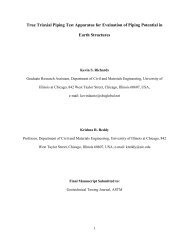Toward a Useful Theory of Mentoring: A Conceptual Analysis and ...
Toward a Useful Theory of Mentoring: A Conceptual Analysis and ...
Toward a Useful Theory of Mentoring: A Conceptual Analysis and ...
Create successful ePaper yourself
Turn your PDF publications into a flip-book with our unique Google optimized e-Paper software.
to the relationship. This implies, then, that it is indeed possible for David to continue as<br />
George’s mentor even though George has an equal or greater rank. The definition also<br />
suggests that George <strong>and</strong> David can be one another’s mentors, so long as it is in entirely<br />
different domains <strong>and</strong> there is unequal knowledge.<br />
We feel that the dependence <strong>of</strong> mentoring on formal hierarchies is a misstep that<br />
occurred early in the history <strong>of</strong> mentoring research <strong>and</strong> is now well worth rectifying.<br />
Indeed, recent mentoring work has already begin to adjust to nonhierarchical<br />
relationships (see Higgins & Kram, 2001). Let us consider just a single example that<br />
shows the problematic nature <strong>of</strong> subjecting mentoring to hierarchical relation. Anyone<br />
who has combat experience in the U.S. military has a good likelihood <strong>of</strong> having<br />
witnessed the mentoring <strong>of</strong> junior <strong>of</strong>ficers by hierarchically subordinate, but more<br />
experienced, non-commissioned <strong>of</strong>ficers. A reading <strong>of</strong> combat memoirs (e.g. Manchester,<br />
1982; Wolff, 1994) reveals these relationships between junior <strong>of</strong>ficers <strong>and</strong> noncommissioned<br />
<strong>of</strong>ficers fulfill all <strong>of</strong> the attributes associated with mentoring, excepting<br />
only the unneeded criterion <strong>of</strong> unequal hierarchical status. Such mentoring not only<br />
affected careers but saved countless lives.<br />
With respect to the “is acknowledgement required?” question, the answer from<br />
our definition is “yes.” One reason we choose this approach is that the perception <strong>of</strong> the<br />
mentoring may sometimes be as important as the fact <strong>of</strong> knowledge transmission. Note<br />
that our definition does not suggest that mentoring is effective, only that the knowledge<br />
received is perceived as useful. We <strong>of</strong>fer this in defense: how sensible is it to speak <strong>of</strong><br />
having a mentor if one feels that the knowledge provided by the mentor is useless?<br />
Another implication <strong>of</strong> our definition, an especially important one, is that<br />
18



